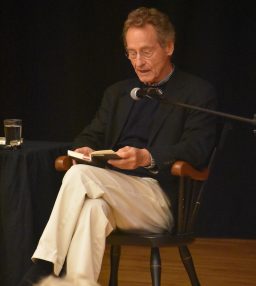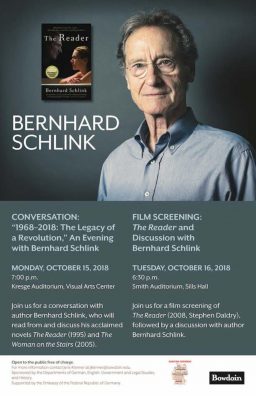Renowned German Author Bernhard Schlink Visits Bowdoin
By Aleksia Silverman ’19
Award-winning German writer Bernhard Schlink spent two days at Bowdoin this week meeting with students and faculty, visiting classes, and participating in evening events.
On Monday night, he read from his critically acclaimed 1995 novel, The Reader. The Reader, which topped the New York Times bestseller List, follows a brief romantic relationship between a young German boy, Michael, and an older women, Hanna. The novel describes their affair in 1958, and progresses to 1966, when, as Hanna faces trail for war crimes committed during WWII, her well-guarded secret threatens to emerge. Director Stephen Daldry adapted the novel into a 2008 movie starring Kate Winslet and Ralph Fiennes.
In Assistant Professor of German Jens Elias Klenner’s introduction to the evening, he praised Schlink’s introspective novel’s ability to “ask us to read again, more than once slowly,” and “to serve as a looking glass into a troubled times.”

During a question and answer segment after the reading, Bowdoin staff, faculty, and students, as well as members of the Brunswick community, spoke with Schlink on a number of topics. Schlink, who is not just a novelist but also a retired judge and emeritus philosophy of law professor, talked about his oeuvre of mystery novels, the generational divides he senses in Germany, and the intersection of his fictional work with his expertise in law.
Schlink returned often to the theme of “entanglement,” both the sort that one may have with a historical past, and the sort that one may have with a lover’s flaws. Indeed, the novel speaks to the complicated task of the generation of Germans to which Schlink, born in 1944, belongs—to reconnect with the older generation’s complicity in the Third Reich, and navigate the building of a new Germany. “How to relate to the parent generation, the generation that committed the crimes,” said Schlink. “This was the issue for my generation.”
The 2008 film adaptation of The Reader was screened on Tuesday, followed by a discussion with Schlink.